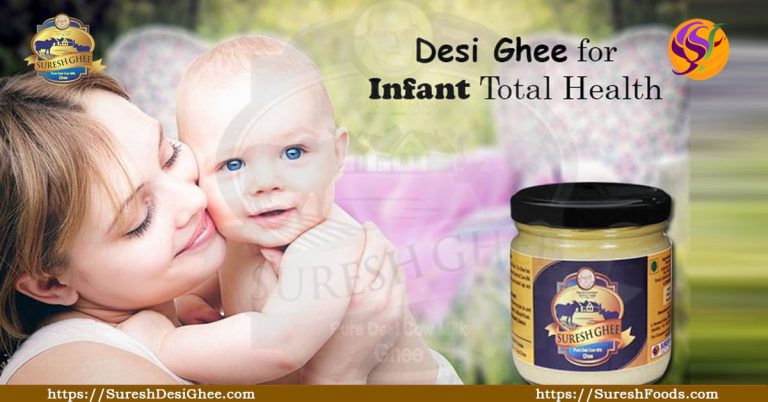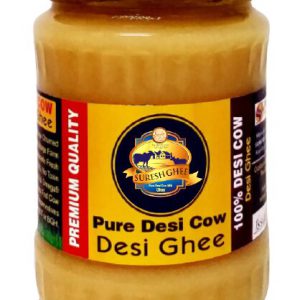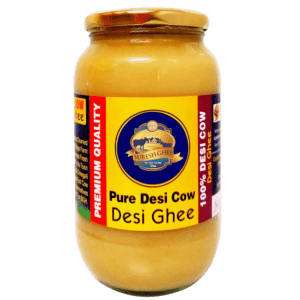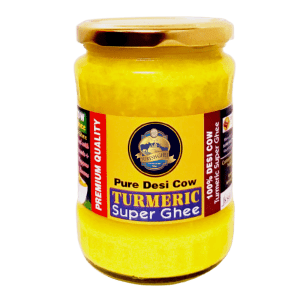Desi Ghee for a newborn should be avoided. However, after 6 months when you want your baby to eat little food with breast milk, you may like to add a pinch of additional fat to your baby’s diet for extra care and energy.
Pure Desi Ghee has been used for ages, Ayurveda proves the same. Desi Cow Milk Ghee has been considered to be an important ingredient of Ayurvedic medicine & used in various Ayurvedic treatments.
Desi Ghee has great health benefits for a growing baby if taken in limited quantities. When babies are weaned off of mothers’ milk, they begin to lose weight. Giving ghee to babies can help them gain and maintain the weight appropriate for their age. Due to the high calories in desi cow ghee, it can be fed to toddlers who require more energy once they start walking. However, before making any dietary changes it is always best to consult your baby’s doctor.
Desi Ghee can be consumed even by the person intolerant of lactose and casein. This is true that Desi Ghee has a negligent portion of Calcium; but, desi cow milk ghee in omega 3 and 6, soluble & insoluble vitamins like A, D, E and K.
A growing baby needs almost 1500 calories per day for optimum growth and physical and mental development. Including Ghee in your baby’s daily diet is an easy way to boot his calorie intake and keep him active.

Buy Pure Ghee Online: Order Now. Free Shipping
Studies show that 30 to 35 per cent of calories that a baby need came from FAT. But be wise to feed him with correct fat, not just fried food. Use ghee in daliya, khichari, roti, dal, vegetables etc.
After you stop breastfeeding your baby may subsequently start losing weight. It is because the fat intake of your baby is not sufficient after you stop breastfeeding. To control fat deficiency, introduce ghee in his diet to maintain his fat intake per day.
‘Desi Ghee’ is a healthy source of fat and contains the all-important Docosahexaenoic acid (DHA). DHA has been deemed as necessary for brain development and growth
Desi Cow Milk Ghee is also renowned for its anti-fungal, anti-oxidant, anti-bacterial, and anti-viral properties which can boost eyesight, immunity, digestion and help your baby achieve optimal growth.
Desi Ghee is easy to digest, lactose friendly, and rich in vitamin food for infants.

When and how to give ghee to your baby, infant and its health benefits?
How much is too much for infants
Ghee For Babies
| Month (Year) | Quantity | Servings |
| Six Months | 1/2 teaspoon | 2 |
| Eight Months | 3/4 to 1/2 teaspoon | 2 |
| Ten Months | 1 to 3/4 teaspoon | 3 |
| 1 year onwards | 1 to 1 1/2 teaspoon | 3 |
| 2 year onwards | 1 1/2 to 2teaspoon | 3 |

Helps in case of indigestion
Cow ghee for infants has compounds that make digestion easy for them, who have just shifted from breast milk to semi-solid food. It has simplified fats which get absorbed easily by the baby’s body. As giving salt to kids, until they attain the age of one is not suggested. Thus ghee can be given to them to add on, to the flavour of the food.
Helps in brain development
Between conception and age three a child’s brain undergoes an impressive amount of change. In the first three years, a child’s brain has up to twice as many synapses as it will have in adulthood. Thus, ghee has Docosahexaenoic acid (DHA) which helps in the development of the brain and pays way onto the benefits of ghee for babies. Ghee is considered the best food for healthy brain development of the baby.
Helps in weight gain
Every baby is unique, some put on weight gradually and some take time. Ghee is a better option for your baby to get saturated fats, which in turn helps in gaining weight.
Great energy booster
Your baby needs all the energy in the world, to start discovering and learn new things. Thus, ghee can be a great energy booster to your child for all its naughty activities which can give a broad smile on your face at the end of the day.
Benefits of ghee for babies in the form of Vitamin A,D,E and K
Ghee has a high content of Vitamin K2 which adds on with milk having Vitamin C. Hence, ghee and milk go hand-in-hand for the better growth and development of the bones and teeth of your baby. Vitamin A is also good for your baby’s eyes. Vitamin D improves calcium absorption and prevents inflammation of the body. Vitamin E helps to maintain a good immune system. And Vitamin K regulates the blood-clotting activities in the body.
Ghee contained food found in almost every Indian kitchen. Some nutritionists have given the nasty name “fat”. But now people realized that “Ghee” is the healthiest alternative over butter, Dalda, vanaspati oils.
- For babies health
As ghee may be a rich source of antioxidants, it’s good for babies’ growing system protecting the baby from diseases. The antioxidants present within the body will protect your baby from infections. Homemade ghee helps to soak up the fat-soluble vitamins sort of A, D, E, K. These all vitamins are well rounded for the health of your baby. one of the important parts of your child is DHA, which possesses properties in ghee.
- Use as a massage oil
Many families are using ghee as massaging for his or her baby. Ghee protects the body from cold and helps in moisturizing the baby’s skin because it produces heat within the body while massaging and improves the blood circulation within the body for development. Do massage your baby with ghee in winters and sparingly in summers.
- Treats dry cough
We know ghee has anti-inflammatory benefits in nature. Warm ghee is beneficial within the cavity and reduces irritation caused by dry cough. You have to give a small tablespoon of ghee by heating with a bit of ginger and black pepper to your baby twice every day.
- Lower effect on Free Radicals
Ghee is taken into account as the healthiest fats precisely because it’s a high smoke point. It denotes that it can’t easily break down into free radicals because the increase in free radicals in your baby’s body can cause respiratory issues and health-related problems.
FAQ
No, ghee does not give rise to constipation in babies. In fact, it may support in relieving constipation and balance the bowel movements. It is most often employed as a laxative or involved as an ingredient in laxative formulations.
Yes, implementing the fundamental cereal of the family, such as rice, is the most suggested practice for babies. If rice is your essential cereal, implementing it into your baby’s meal along with some ghee is beneficial. The addition of ghee improves the energy content of the food.
Babies can start to include ghee into their meal at six months of age. Although, if they possess a milk allergy or lactose intolerance, it is pivotal to consult with a doctor initially. However, there is no rigorous limit on ghee consumption for babies, it is normally recommended to restrict intake to one teaspoon per day for infants under 12 months.
The nutritious benefits of ghee for children involve assisting healthy weight gain, supporting digestion, improving bone strength, and enhancing immunity. It is paramount to understand that excessive ghee intake on a regular basis can result in problems such as weight gain, indigestion, and loss of appetite.







 WhatsApp us
WhatsApp us
Naveen m...